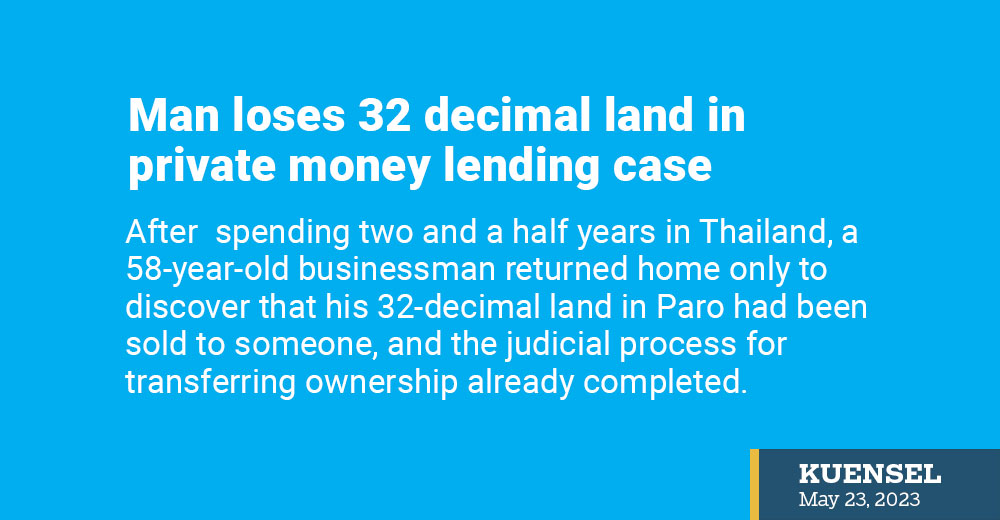Police implicate a middleman for forgery and illegal sale of land
Rinzin Wangchuk
After spending two and a half years in Thailand, a 58-year-old businessman returned home only to discover that his 32-decimal land in Paro had been sold to someone, and the judicial process for transferring ownership already completed.
Soon after his return, Karma Wangdi wanted to cancel the land that had been mortgaged with a private money lender, as his wife had already repaid the Nu 1 million (M) loan he had taken before leaving for his medical treatment.
However, Karma Wangdi received a shock when the Tsento gup called him to confirm whether his plot in Jitsiphu had been sold to a man named Tshering Dorji from Hungrey gewog.
“I was shocked to hear the news and immediately rushed to the gup office to inquire about how the transaction was done without my consent,” Karma said. The gup had called him to enforce a court judgment that directed the transfer of ownership to the buyer’s name. Both the High Court and the Dzongkhag Court ruled in favor of the plaintiff, Tshering Dorji.
Karma Wangdi discovered that the case was represented on his behalf by Namgay Wangchuk as legal counsel (Jabmi) after Tshering Dorji filed a civil suit against him. “Namgay Wangchuk is a complete stranger to me,” he said. “I did not give power of attorney to anyone nor did I sell my land.” Karma Wangdi claimed that both the lower and high courts failed to verify whether the land was sold or not.
“The appellate court could have summoned me to testify, but it passed judgment based on forged documents and an unauthorized jabmi,” he alleged. Tshering Dorji filed the case because he was unable to transfer the land he had bought into his name.
Was he cheated?
Karma Wangdi was seeking a private lender to borrow Nu 3M to Nu 5M for his medical treatment abroad. Wangchuk Dorji, a broker, introduced him to two individuals – Karma Yangki and Tshering Dorji. He borrowed Nu 1M from Tshering Dorji through Karma Yangki at a monthly interest rate of 10 percent. Since the Royal Monetary Authority’s (RMA) rules limited private money lending to Nu 90,000 only, the sales deed for the 32-decimal land was made under the pretense that it was sold to Tshering Dorji for Nu 3.2M.
They signed the sales deed on March 13, 2020, with Karma Yangki as Tshering Dorji’s witness and Wangchuk Dorji as Karma Wangdi’s witness. However, Karma Wangdi received the money from Karma Yangki and not from Tshering Dorji. He claimed that he received Nu 0.8M through a cheque from Karma Yangki, who took Nu 100,000 as a commission. She also gave Nu 50,000 each to Wangchuk Dorji and her driver.
After borrowing Nu 1M, Karma Wangdi went to Bangkok on March 20, 2020, for treatment. Due to Covid-19 and travel restrictions, he was only able to return home on September 16, 2022. During his absence, Wangchuk Dorji allegedly sold his land to Tshering Dorji. Karma Wangdi then appealed to the Supreme Court (SC) to reopen the case since his land was sold without his knowledge. The SC dismissed his appeal, stating that he had failed to appear before the court during the appeal period and that he had signed the documents.
Karma Wangdi and his wife then lodged a formal complaint with the police on February 3 this year, alleging that Karma Yangki, Tshering Dorji, Wangchuk Dorji, and Namgay Wangchuk had robbed them of their land through collusion, forgery, and deceptive practices.
Police’s findings indicate that Wangchuk Dorji confessed to forging Karma Wangdi’s signature and taking advantage of the landowner’s absence. Tshering Dorji claimed that he paid Nu 5.171M for the land. However, the transfer of land ownership remained pending, even though the judgment had already been passed in favor of the buyer, according to investigation officers.
“This is an offshoot of illegal private money lending businesses,” they said. Police have implicated Wangchuk Dorji for forgery and fraudulent practices, along with the other parties involved. The case has been forwarded to the Office of the Attorney General last month for probable prosecution.


